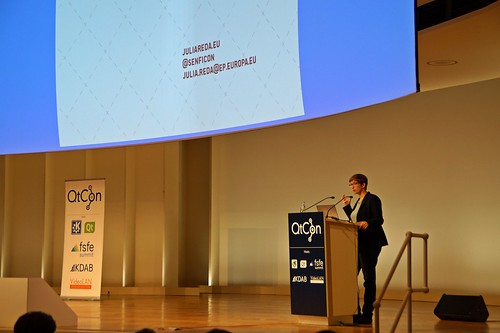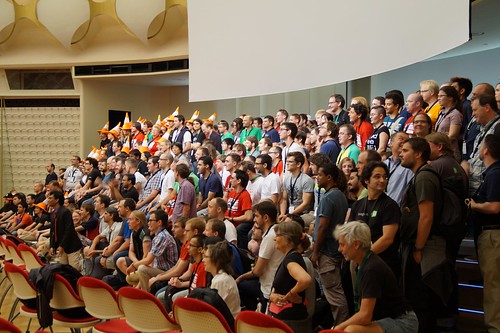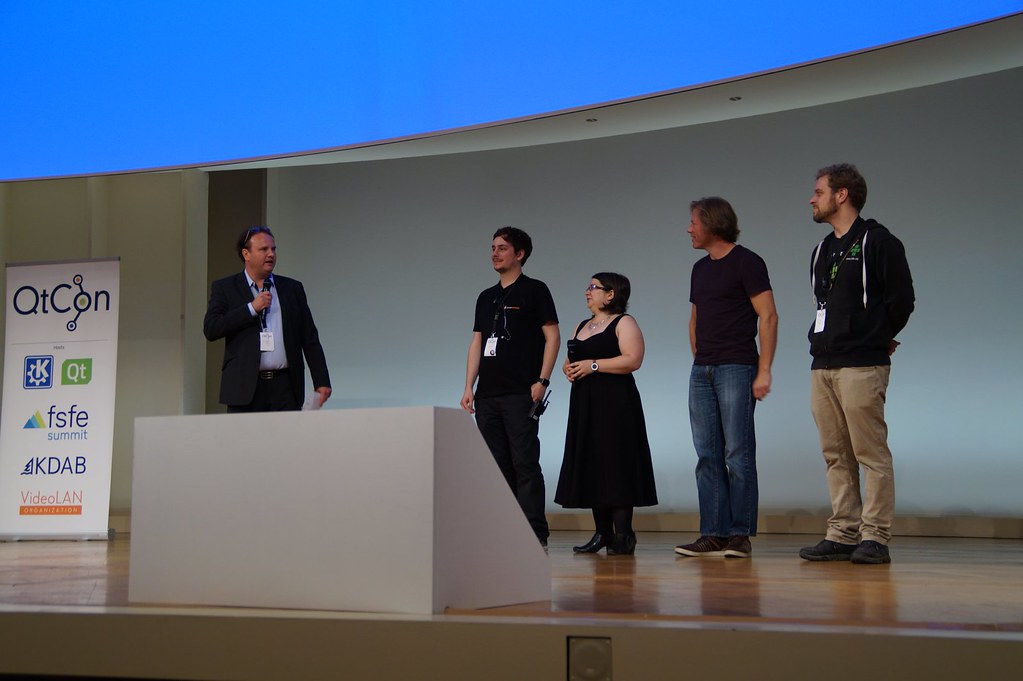QtCon Closing Keynote with Julia Reda MEP
The talks are over after the three days of QtCon Akademy 2016 which means the BoF sessions and hacking days are about to begin. To close the talks at the conference we had a finishing keynote by Julia Reda, Member of the European Parliament and member of the Pirate Party.
She began by saying that on a fundamental level government is all of us, and it provides the infrastructure for our culture. Software used by the government is also a public service and the only philosophy that takes responsibility for that is free and open source software. Getting governments to use free and open source software is more important then ever because of the importance of technology in society. Computers are no longer limited to some parts of our lives, they are integral to everything we do. She gave the example of the VW Dieselgate scandal which is linked to cars being computers on wheels. There are no check that the software that is tested by regulators is the same that is run by the car hardware. Another interesting aspect is limitations on diesel control can be turned off to save the engine which means in practice they do this a lot and don't even need to tell the regulators. VW had a function programmed into the car which turned off the fuel saving if it deviated from the testing procedures.
Another area were we see the importance of software is robotics. A friend who wears a cochlear implant hearing aid has software which can control what you hear. Software on a pacemaker can be more scary. The source code for her friend's pacemaker had a bug and to test it they had to put her on a treadmill to debug it as there was no other way with the code not being available. Julia wants to know what software is run on her body. The EU parliament is discussing this issue.
An older debate is the use of technology in elections. In US voting infrastructure isn't considered critical infrastructure so it's not treated like an issue even when it has known problems. It's important to be able to inspect any software which has important functions. A more social issue is the debate about whether Facebook algorithms can influence elections. Predictive policing can encourage racist stereotypes, if that's done with software and we don't know how it works any biases can be very dangerous.
If you have Windows 10 running on your fridge there are more fun ways your software can fail. In some fields you might become legally barred from inspecting and tinkering your hardware. Freedom to tinker is important for education and also autonomy and it should be protected in a similar way as a freedom of speech. Information is governed differently from physical goods. Books can have owners but e-books are licensed and can't necessarily be given to your children when you die. Manufacturers will try to get us to rent things rather than buy them. There are tractors where the manufacturer told the owners they could not modify the tractor because that was not in their license. Circumvention of technological protections (such as DVD encryption) should be allowed. Even though these common sense demands were supported by the EU parliament, the EU Commission's proposals are different and e.g. want charges on news aggregators. There are no positive developments yet in copyright to give us more control. Another concerning area is trade secrets, which started as defending uncompetitive behaviour. If you break into the office of a competitor and steal plans that would be covered. But now manufacturers can claim the software is a trade secret and the regulator can't see it, which makes no sense. The US is introducing this into trade agreements to stop say China reading the software from US companies, so we have to make sure governments at least are able to see the software.
There are social developments that make free software significant. Some companies will restrict functions on their products by software which is dangerous. Finally there are moves for laws on what software can be installed on wifi hubs. Manufacturers should make sure users don't use the wrong spectrum but to allow competition, the US FCC has insisted you should allow 3rd party software. So we may have to have trusted computing type signed images for routers which makes installation of Linux on them much more challenging. What can government do about these issues? It's important we make the point governments rely on free and open software. Governments need to start taking responsibility of free software. There's a Prototype Fund in Germany where money is given to free software projects and helps with bureaucracy. With HeartBleed and ShellShock we saw a lot of infrastructure relies on free software but there's no responsibility from manufacturers to take care of it. The EU has started FOSSA, a project to audit free software. Asked in a survey which projects the EU should audit, most votes were for Apache HTTP and Keypass. The 2 year pilot project is coming to an end but they want to continue it and get a permanent budget. Also they want a bug bounty budget. In the future it's important to work within the system and build networks with free software communities and the EU commission. In Bulgaria and the US there are source code policies, they are not perfect but the US has a goal of publishing 20% of software as open source which is a lot better than many other governments. The EU commission has an open source policy but it only commits to not disadvantage open source solution in procurement. So her call for action is to move to a sustainable public procurement system and every government in the EU have a free software policy. The goal should be to make governments not just tolerate Free Software but to promote and improve it.
To close the conference we had the annual KDE Akademy Awards and finally representatives of KDAB, KDE, FSFE and VLC came on stage to thank the organisers and wish us a successful onward conference with Akademy.


